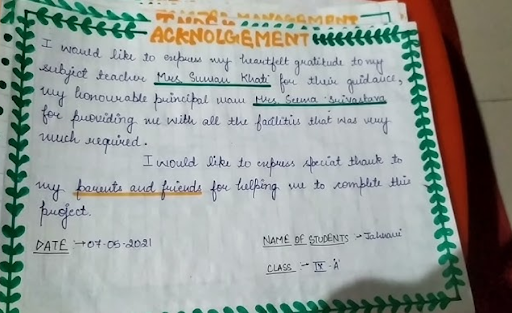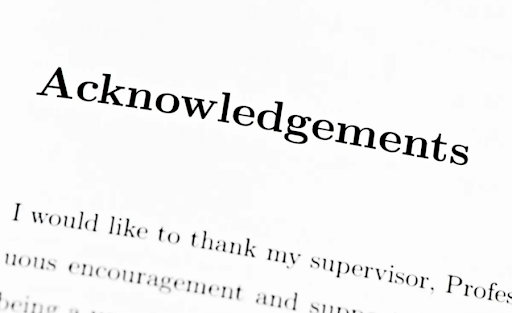College Project Acknowledgement Samples That Get Noticed
In the world of college academics, projects are a vital part of learning and evaluation. Whether it’s a group assignment, a semester-long research paper, or a final-year thesis, students invest considerable time and energy into completing their work. While most focus on the core content, there’s one section that deserves equal attention—the acknowledgement.
An acknowledgement is not just a formality. It’s your chance to show appreciation to those who helped, supported, guided, or inspired you during the project. A well-written acknowledgement can add depth, personality, and professionalism to your submission. In this article, we’ll explore what makes acknowledgements effective, followed by different styles and real sample texts you can draw inspiration from.
Why a Thoughtful Acknowledgement Matters
Acknowledgements are often overlooked, but they leave a lasting impression. Professors and evaluators notice when a student shows gratitude sincerely and creatively. It reflects maturity, good ethics, and communication skills—qualities that extend beyond the classroom.
Here’s why a good acknowledgement matters:
- It adds a personal touch to academic work.
- It reflects your awareness of collaboration and support.
- It helps build rapport with mentors and teachers.
- It contributes to academic integrity and respect.
Basic Structure of an Effective Acknowledgement
While every acknowledgement can be customized, it generally follows this flow:
- Opening line expressing gratitude.
- Thanking academic guides or supervisors.
- Mentioning institutional support.
- Appreciating family, friends, or peers.
- Closing line with final words of thanks.
Now, let’s look at various samples that reflect different tones and styles.
Sample 1: Formal and Professional
This version suits serious academic work such as research papers, dissertations, or final-year projects.
I would like to express my sincere gratitude to my project guide, Professor [Name], for their continuous guidance, valuable feedback, and encouragement throughout the completion of this project. Their insight and expertise greatly contributed to the clarity and depth of my research.
I would also like to thank the [Department Name] of [College/University Name] for providing the resources and environment necessary to carry out this work.
My heartfelt thanks to my classmates and friends who provided useful suggestions and support during various stages of the project. Finally, I express my deep appreciation to my family, whose patience and motivation kept me focused from start to finish.
Sample 2: Personal and Heartfelt
This version is ideal for creative or individual assignments where personal experiences matter.
This project has been more than just an academic requirement—it has been a journey of learning, reflection, and growth. I want to thank my guide, [Professor’s Name], for being a constant source of support and for encouraging me to think beyond the obvious.
Special thanks to my parents, who believed in my abilities even when I doubted myself. Their unwavering support, both emotionally and practically, played a big role in helping me complete this work.
I’m also grateful to my friends, who were always available to discuss ideas, share notes, and offer honest feedback. Every conversation helped me refine my thoughts and improve my content.
Sample 3: Group Project Acknowledgement
This one works best for collaborative college projects with multiple contributors.
We are grateful to our project mentor, [Professor’s Name], for providing us with clear direction and valuable feedback throughout this assignment. Their involvement helped shape our ideas and improve the quality of our work.
We thank our institution, [College Name], for the infrastructure and support that enabled us to conduct our research and present our findings efficiently.
Our appreciation also extends to each member of our group for their dedication, communication, and cooperation. Each contribution was essential in completing this project on time and to the best of our abilities.
Lastly, we would like to thank our families and peers for their encouragement and understanding during the busy weeks of this project.
Sample 4: Creative Style
Perfect for students looking to stand out with a different voice or tone.
Every project begins with an idea, but it takes many minds and moments to turn that idea into something complete. I would like to thank Professor [Name], who acted as the compass throughout this academic journey, helping me stay on course.
Thanks to the library staff for pointing me toward just the right books, and to my fellow students who listened patiently to every version of my idea until it finally made sense.
To my parents: thank you for giving me the time and space I needed—even when it meant missing out on a few family dinners.
This project is a reflection of the time, effort, and care of everyone who stood behind it.
Tips to Make Your Acknowledgement Stand Out
- Avoid clichés: Try not to use overused phrases like “last but not least.” Instead, use honest, natural wording.
- Be specific: Instead of saying “thanks to my teachers,” mention their names and what exactly they contributed.
- Keep it balanced: Acknowledge both academic and personal support without going overboard in either direction.
- Be concise: Express your gratitude clearly but avoid turning it into a long essay.
- Avoid humor unless appropriate: While a light tone works in informal projects, stick to respectful language for academic work.
Final Thoughts
An acknowledgement may seem like a small section, but it carries emotional and ethical weight. It’s a space to pause and recognize that success is rarely a solo effort. Taking time to express gratitude genuinely is not only good academic practice but also a life skill.
In the fast-paced academic world, where submissions and deadlines dominate the calendar, a well-written acknowledgement reminds everyone involved that behind every project is a network of support, encouragement, and shared effort.
So, before you hit print or submit, read your acknowledgement one more time. Ask yourself: does it sound like you meant every word? If the answer is yes, then your acknowledgement is not just noticed—it’s remembered.





